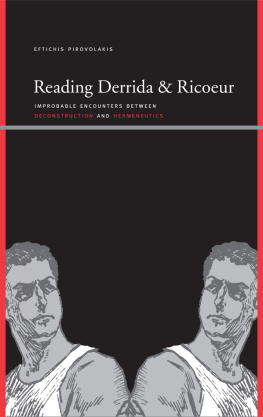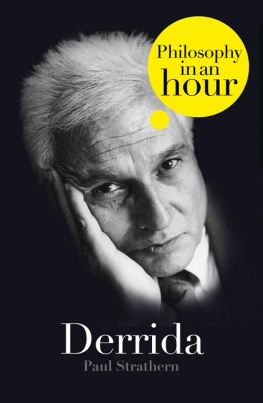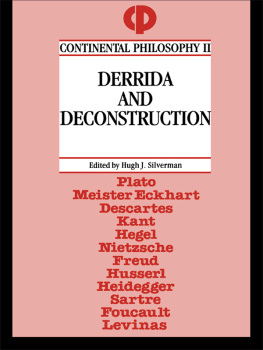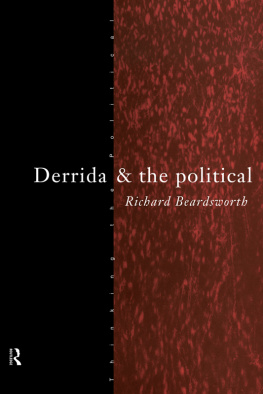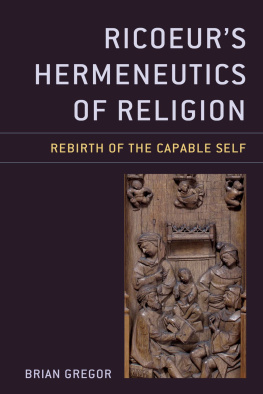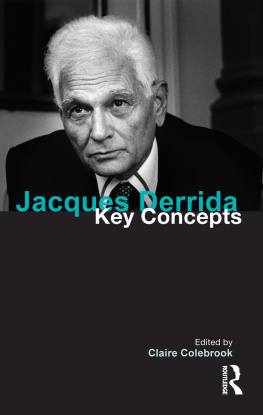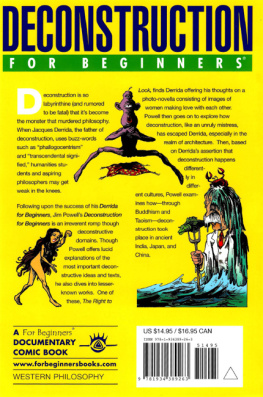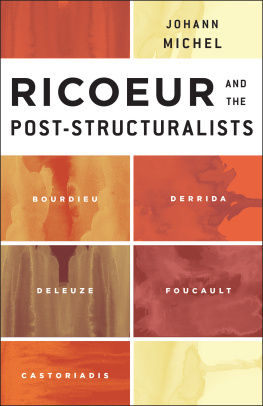SUNY series: Insinuations: Philosophy, Psychoanalysis, Literature

Charles Shepherdson, editor
Reading Derrida and Ricoeur
Improbable Encounters between Deconstruction and Hermeneutics
Eftichis Pirovolakis

The Word: Giving, Naming, Calling by Jacques Derrida was originally published in French as: La parole: Donner, nommer, appeler, in Paul Ricoeur, ed. Myriam Revault d'Allones and Franois Azouvi, L'Herne, no. 81 (Paris: ditions de L'Herne, 2004) 1925, Copyright 2004 ditions de L'Herne. It is reproduced here with permission by ditions de L'Herne and Marguerite Derrida. English translation 2010 Eftichis Pirovolakis.
Published by State University of New York Press, Albany
2010 State University of New York
All rights reserved
Printed in the United States of America
No part of this book may be used or reproduced in any manner whatsoever without written permission. No part of this book may be stored in a retrieval system or transmitted in any form or by any means including electronic, electrostatic, magnetic tape, mechanical, photocopying, recording, or otherwise without the prior permission in writing of the publisher.
For information, contact State University of New York Press, Albany, NY
www.sunypress.edu
Production by Eileen Meehan
Marketing by Anne M. Valentine
Library of Congress Cataloging-in-Publication Data
Pirovolakis, Eftichis, 1970
Reading Derrida and Ricoeur : improbable encounters between deconstruction and hermeneutics / Eftichis Pirovolakis.
p. cm. (SUNY series, insinuations: philosophy, psychoanalysis, literature)
Includes bibliographical references and index.
ISBN 978-1-4384-2949-6 (hardcover : alk. paper)
1. Deconstruction. 2. Derrida, JacquesCriticism and interpretation. 3. Ricur, PaulCriticism and interpretation. 4. Phenomenology and literature. 5. Hermeneutics. 6. LiteraturePhilosophy. 7. CriticismHistory20th century. I. Title.
PN98.D43P57 2010
801'.95dc22 2009014349
10 9 8 7 6 5 4 3 2 1
For Antony and Cleopatra
Acknowledgments
In the course of writing this book, I have been indebted to the support and friendship of many people. I would like to thank Laura Marcus and Vicky Margree for their help and vital advice; Sean Gaston for his friendship and numerous thought-provoking conversations on Derrida and Ricoeur; the anonymous readers for State University of New York Press for their encouraging and constructive comments; and the series editor Charles Shepherdson and James Peltz for helping the finished manuscript through its last stages.
I would also like to express my gratitude to Joanna Hodge and Nick Royle for examining my Sussex doctoral thesis on which this book is based, for kindly making available to me some of their unpublished papers and for their very positive contributions towards the completion of this project. I am especially grateful to Cline Surprenant for her vital supervisory role during the later stages of the research, and for her generosity in reading very closely and offering incisive criticism and invaluable advice on the original manuscript. I am also greatly indebted to Geoff Bennington for the range of knowledge he has brought to my work, for helping me clarify my arguments at certain important points during the early stages of this project and, most of all, for continuous inspiration and encouragement since 1993. Very special and singular thanks are due to Vassiliki Dimitropoulou for her patience, understanding, and overall support.
Finally, I would like to record my gratitude to the Alexander S. Onassis Public Benefit Foundation for its financial assistance between 2001 and 2004, and to Marguerite Derrida and ditions de L'Herne for kindly authorizing the translation into English of Jacques Derrida's La parole: Donner, nommer, apeller, which appears here as an appendix. Some of the arguments on Ricoeur's narrative theory in the second section of have been anticipated in my Donner Lire: Unreadable Narratives, Literature Interpretation Theory 19, no. 2 (2008): 100122.
List of Abbreviations
The following abbreviations will be used in the main body of the text and the notes. They will be followed by volume number, where appropriate, and page number to the English translation. Details of the edition referred to appear under the author's name and title in the bibliography.
Works by Jacques Derrida
| AF | Archive Fever: A Freudian Impression |
| AP | Aporias: DyingAwaiting (One Another at) the Limits of Truth |
| FSW | Freud and the Scene of Writing |
| GD | The Gift of Death |
| LI | Limited Inc a b c |
| MPM | Mmoires: For Paul de Man |
| PG | The Problem of Genesis in Husserl's Philosophy |
| PM | Perhaps or Maybe |
| SEC | Signature Event Context |
| SP | Speech and Phenomena: And Other Essays on Husserl's Theory of Signs |
| SF | To SpeculateOn Freud |
| VM | Violence and Metaphysics: An Essay on the Thought of Emmanuel Lvinas |
| W | The Word: Giving, Naming, Calling |
Works by Paul Ricoeur
| FM | Fallible Man |
| FP | Freud and Philosophy: An Essay on Interpretation |
| H | Husserl: An Analysis of His Phenomenology |
| IT | Interpretation Theory: Discourse and the Surplus of Meaning |
| MHF | Memory, History, Forgetting |
| OA | Oneself as Another |
| QS | The Question of the Subject: The Challenge of Semiology |
| RM | The Rule of Metaphor: The Creation of Meaning in Language |
| SWE | Structure, Word, Event |
| TA | From Text to Action: Essays in Hermeneutics II |
| TN | Time and Narrative |
Works by Sigmund Freud
| SE | The Standard Edition of the Complete Psychological Works of Sigmund Freud |
Works by Edmund Husserl
| CM | Cartesian Meditations: An Introduction to Phenomenology |
| Ideas I | Ideas: General Introduction to Pure Phenomenology |
| PITC | The Phenomenology of Internal Time-Consciousness |
Introduction
An encounter simultaneously tangential, tendentious, and intangible begins to emerge but also slips away.
Jacques Derrida, The Word: Giving, Naming, Calling
Any account of the contentious relation between Paul Ricoeur and Jacques Derrida cannot fail to be marked, initially at least, by a feeling of melancholy and a certain mournfulness. Not only because the two thinkers, having recently passed away within only a few months of each other, will not have the opportunity to contribute to or revisit the various debates in which they jointly participated for approximately fifty years. But also because, even when they were alive, most of their public encounters could be described, at best, as missed opportunities of a fruitful dialogue. Hence a sense of sorrowfulness with respect to the distance separating deconstruction and hermeneutics, those two most influential streams of contemporary European thought.

